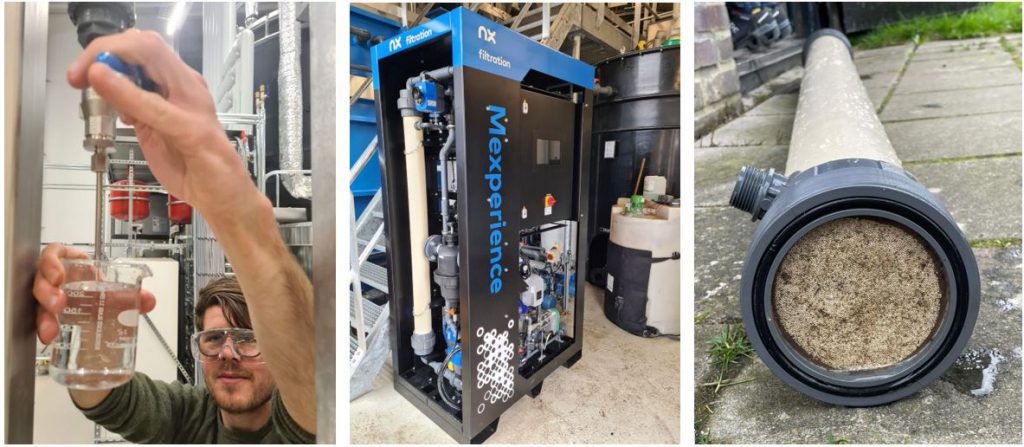Integrated greywater treatment using nanofiltration for the production of reusable water
To meet the ever-increasing anthropogenic water demand while simultaneously tackling water scarcity, new alternative sources of water need to be explored. One attractive alternative to meet our water demand is the reuse of source-separated greywater. Greywater omits toilet water from domestically produced wastewater, thereby reducing the bacterial load of the wastewater, and is therefore considered highly suitable for water reuse. Greywater treatment systems have successfully been implemented in the past years. However, the emergence of new contaminants, such as micropollutants, and upcoming legislative measures require overhauling of the current system to meet the new quality standards. Recently, several treatment solutions have been investigated. Hollow-fiber nanofiltration has shown to be a highly effective and attractive treatment technology to remove micropollutants and produce high-quality greywater effluent. However, to combat water scarcity, further research is required to upgrade the effluent to standards that meet a range of reuse applications.
Research challenges
While substantial research into implementing nanofiltration as a post-treatment technology in wastewater systems has been performed in the past decades, challenges with fouling, concentrate treatment and disposal, and operational costs have hampered the general adoption. Recently, a substantial number of these challenges have been tackled by the implementation of newly developed hollow-fiber nanofiltration membranes in greywater treatment systems. Integrated greywater treatment, consisting of biological treatment combined with hollow-fiber nanofiltration, has shown promising results by effectively removing most microbial contaminants and reducing micropollutant concentrations from the effluent substantially. While this has proven the viability of the concept, further research is still required to enable reuse. To fully unlock the potential of advanced greywater treatment for the production of reusable water, research, including, but not limited to, long-term process stability, effective pre-treatment solutions, membrane integrity monitoring, sustainable and adequate concentrate handling, and the removal of micropollutants/priority compounds, requires extensive attention.
Your assignment
This project aims to further advance integrated greywater treatment, combining biological treatment and membrane filtration, for the eventual production of reusable water. To reach this, you will investigate the entire treatment process on several scales. You will perform both laboratory as well as pilot-scale experiments which will explore different avenues of greywater effluent treatment. You will investigate pre-treatment solutions that enhance the overall (bio-)stability of the effluent. Furthermore, you will explore a range of concentrate treatment solutions that focus on the removal of emerging contaminants to increase the overall sustainability of membrane filtration processes in domestic wastewater treatment. Additionally, the produced water quality will be investigated for reuse application as well as priority compounds, and solutions that enhance the water quality will be explored. These results will be translated to and implemented in an existing greywater treatment plant to evaluate the proposed integrated greywater treatment system in relevant environmental conditions.
Your Profile
You have a master’s degree in chemical engineering, (bio)process engineering, environmental engineering or equivalent. You are an independent, motivated student with an affinity for multidisciplinary research and are willing to delve into topics outside your current knowledge base. You like working in a dynamic environment and enjoy tackling challenges as they arise. Being in possession of a driver’s license is a plus.
Keywords: Source-separated sanitation, membrane technology, circular water treatment, micropollutants, water reuse
Supervisory Team: University promotor and co-promotor: Prof. Dr. Ir. Walter van der Meer (Twente University, Membrane Science & Technology), Dr. Ir. Antoine Kemperman (Twente University, Membrane Science & Technology)
Wetsus Supervisor(s): Dr. Ir. Sam Rutten (daily supervisor), Dr. Ir. Lucía Hernández Leal (scientific advisor)
Project partners: Advanced Water Treatment
Only applications that are complete, in English, and submitted via the application webpage before the deadline will be considered eligible.
Guidelines for applicants: https://phdpositionswetsus.eu/guide-for-applicants/
